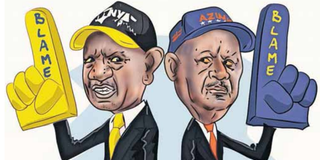Truce OK, but expand dialogue

The truce reached on Sunday by President William Ruto and Raila Odinga bore all the hallmarks of statesmanship and pragmatism triumphing over destructive obduracy
President William Ruto and opposition leader Raila Odinga each had the choice between wisdom and foolishness, and fortunately for us both took the right option.
The truce reached on Sunday bore all the hallmarks of statesmanship and pragmatism triumphing over destructive obduracy. It also showed that both men could free themselves from the shackles imposed by extremist hardliners within their respective camps and work towards what is good for Kenya rather than be bound by self-interest.
President Ruto deserves plaudits for taking the initiative in publicly holding out the olive branch, and Mr Odinga too for quickly accepting it.
Just by merely agreeing to engage, the two leaders have steered Kenya from likely descent into a calamitous path. Everybody can heave a sigh of relief in Mr Odinga calling off the increasingly violent protests pending actual action on President Ruto’s offer of a bi-partisan approach in Parliament to his demands for a more inclusive approach to filling of vacancies in the Independent Electoral and Boundaries Commission (IEBC).
It is notable that, other than his concession on IEBC appointments, the President actually gave away nothing else in Mr Odinga’s list of demands.
The key plank in the opposition chief’s protests was the demand for electoral justice on claims that he was cheated of victory at the presidential elections of last August. He has been demanding that the election database be opened to prove claims that an IEBC whistleblower had revealed allegedly actual election results making him a clear winner. President Ruto did not address matter at all, other than insisting that the election was credible given the seal of approval by local and foreign observers and validated by the courts.
Cost of living
Neither did he concede anything on demands for lowering the cost of living, an issue Mr Odinga has exploited to whip up public emotion but which can hardly be solved by government decree.
The import, then, was not so much in anything concrete from the truce but in the President ignoring the hardliners, led by Deputy President Rigathi Gachagua, and laying the platform for dialogue, and Mr Odinga readily accepting it, though with no win to show from it.
Agreeing to talk, however, is one thing. Setting the actual mechanism is quite another. Without political will from both sides, the process could be stymied by hurdles likely to be erected by those who remain determined not to cede ground.
There are many in the Ruto court who would feel threatened by any political truce that accommodates the opposition chief. The place is also populated by fellows whose main reason for existence is to project themselves as the key defenders of the system, for which they need enemies to shout at.
The immediate outcome from the truce must naturally be activation of a process in Parliament to revisit the IEBC selection panel. But solutions to opposition protests cannot all be found in Parliament. Hence the need, also, for dialogue at another forum involving teams from both sides, preferably overseen by mutually acceptable mediators.
Beyond the two main political formations, it will also be necessary to include participation of a wide array of interest groups that best represent Kenyan society. This is what will act as a guarantee that the needs of the people, rather than narrow pacts around power-sharing, are the priority.
National dialogue
Ultimately, the focus must be on a national dialogue rather than a Ruto-Raila deal.
This, then, obviously leads a revisiting of the Building Bridges Initiative (BBI) driven by Mr Odinga and then-President Uhuru Kenyatta, which collapsed in the run-up to the last election under furious onslaught from the Ruto forces.
BBI, Mr Odinga’s brainchild, was a noble idea but was bound to self-destruct when the basic principles were jettisoned to be replaced by political horse-trading. The opposition chief has been handed the opportunity to revive the process, even if under another name, and President Ruto should have every reason to embrace it because it actually contains some of the reforms his government is already trying to shepherd.
If the two principal protagonists do not see the need for expansion of dialogue, the people of Kenya can must step forward and initiate an inclusive process. Civil society, religious groups, trade unions, professional associations, business lobbies, academics, media, community organisations and others who want a national dialogue beyond political horse-trading will be critical in this regard.
Ultimately, we must go beyond political contestation to a process focused on addressing the issues of real concern around a just and democratic society where no individual or grouping is left behind.
[email protected]. @MachariaGaitho





